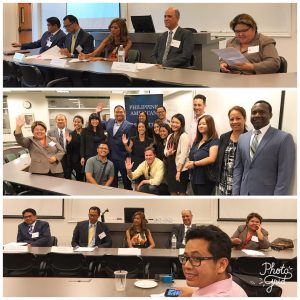Missed connections at the Immigration CLE class
Just recently, at the immigration panel sponsored by the Philippine American Bar Association and the Southwest ern Law School Asian Pacific American Law Student Association.
ern Law School Asian Pacific American Law Student Association.
YOU: Audience member listening with rapt attention to the four excellent speakers gathered for the event.
ME: The speaker who had the unfortunate task of informing everyone that under President Trump’s new enforcement directives, just about every non-US-citizen inside the United States faces the risk of being deemed a “risk to public safety or national security” at the sole discretion of an immigration enforcement officer.
YOU asked a question about whether it would be prudent to seek naturalization, given the fears of what might happen in the event of a denial.
ME: I said that the decision to seek naturalization is a deeply personal one. I would sit down with my clients and discuss the risks and benefits. But I have many aunties who approach me at parties and ask me questions about their green cards, to which I usually respond “Wait, what?! You’re not a citizen?!”
YOU, ME, and everyone else: General laughter.
Perhaps due to the late hour and the concern that we had already exceeded the allotted time for the panel discussion, I did not press to say more. But now that we have more time (and I have infinitely more writing space), here is what I usually say about the benefits of naturalization:
- The shiny blue passport
- The ability to vote in federal elections
- The ability to avoid deportation in the future (provided that the naturalization was not procured by fraudulent means)
- The ability to shield your minor children who currently have green cards against the risk of deportation if they end up straying from the path as adults
If you (and not just the concerned-about-naturalization-question-asker) would like to discuss the risk and benefits of submitting any immigration application, you should speak with an experienced attorney. And hopefully, we won’t have any missed connections.
 Immigration Visa Attorney Blog
Immigration Visa Attorney Blog

